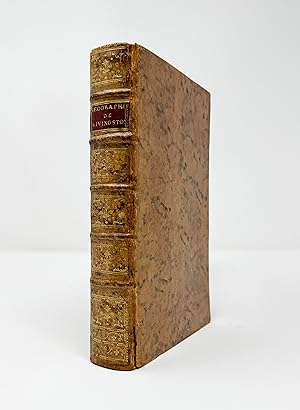About this Item
8vo., (7 7/8 x 5 5/8 inches). With an errata leaf including directions to the binder and the leaf giving "Corrections Respecting France" at the end. 2 EXCEPTIONALLY FINE large folding engraved maps engraved by Amos Doolittle (very small tear at mount on first map). Contemporary French mottled calf, the spine in six compartment, with five raised bands, red morocco lettering-piece in the second, the others decorated with fine gilt tools (short split in foot of upper hinge). A BEAUTIFUL COPY "The time, is anticipated when all distinctions between master and slaves shall be abolished; and when the language, manners, customs, political and religious sentiments of the mixed mass of the people who inhabit the United States, shall have become so assimilated, as that all nominal distinctions shall be lost in the general and honourable name of AMERICANS" (page 68) First edition. The two maps show: ". the States of Virginia, North Carolina, South Carolina and Georgia Comprehending the Spanish Provinces of East and West Florida, Exhibiting the boundaries as fixed by the late Treaty of Peace between the United States and the Spanish dominions." (after Joseph Purcell); and ".the Northern and Middle States Comprehending the Western Territory and the British Dominions in North America." Morse was both a clergyman and one of America's most influential cartographers. His "Geography Made Easy (1784) was the first published textbook on American geography in America. Morse used a questionnaire to gain the knowledge he used to compile this second work, his "American Geography". He circulated it to "such Gentlemen as are able and likely to furnish answers", reprinted it in weekly newspapers, received numerous replies as a result. He quoted from Jefferson's "Notes on the State of Virginia" (1784) and from maps by Lewis Evans, Thomas Pownall, and others. "He queried "men of Science" for information on natural history and other specialties. He obtained statistics on population from magazines and newspapers. In his published book he did not clearly identify his many sources, and he often quoted works directly. He would not use foreign publications, with the comment that "Europeans have . . . too often suffered fancy to supply the place of facts." (Elizabeth Noble Shor for ADNB). Howes M840; Evans 21978; Sabin 50924; Wheat and Brun 149 and 491. Catalogued by Kate Hunter. Seller Inventory # 72lib633
Contact seller
Report this item
![]()
